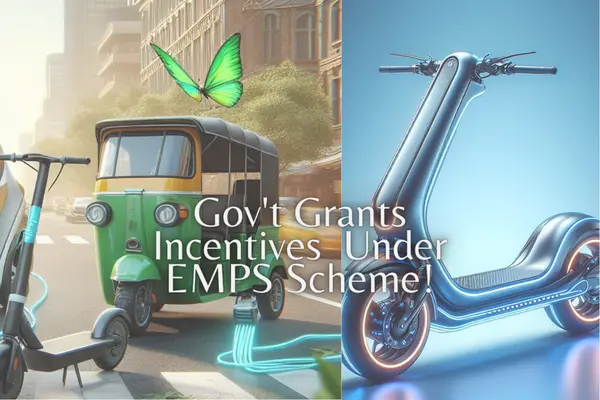Under the new Electric Mobility Promotion Scheme (EMPS) 2024, the government has given its approval to eleven electric vehicle (EV) manufacturers, who will be rewarded. This scheme gives incentives in order to facilitate higher adoption of electric two wheelers (e2W) and three wheelers (e3W) by offering subsidies.
According to the Ministry of Heavy Industries, these 11 firms have been approved for incentives, and more applications are currently under review. The EV companies have welcomed this decision as they were worried about missing out on incentives for sales made post-April 1st. However, approved companies will be entitled to an incentive from the date of their respective approvals. The government still welcomes applications from automakers. All applicants must register as part of this process when they want to benefit from EMPS incentives, to manage increasing demand and ease pressure on EV makers, the maximum subsidy cap has been reduced by the government. For e2Ws it is now at Rs 10,000 per unit down from Rs 22,500 while e3Ws is Rs 50,000 down from Rs 111,505. Additionally, each category will receive a Kilowatt Hour Incentive of Rs 5kwh.
Heavy Industries Minister Mahendra Nath Pandey explained that the subsidy reduction is a response to the high demand for EVs. The government aims to support the industry while preparing it for a future without subsidies, as they cannot be sustained indefinitely.
Approved EV Manufacturers for EMPS 2024–
| Ather Energy | Bajaj Auto |
| BGauss Auto | Ola Electric |
| TVS Motor | Quantum Energy |
| Hero MotoCorp | Hop Electric |
| Kinetic Green | TI Clean Mobility |
| Mahindra |
Electric Vehicle Push Continues: All Information About India’s EMPS 2024 Scheme
April 1, 2024 marked the launch of the Electric Mobility Promotion Scheme (EMPS) 2024 by the Government of India after a successful FAME II scheme. In order to understand what EMPS is targeting at, how it will bring incentives, and its impact, The EMPS 2024 is a fund-limited scheme with total outlay of Rs.500 crore. It will remain operational for four months from April 1st to July31st , 2024. This time constraint aims to create urgency and hence encourage faster adoption of EVs during this period.
India’s electric vehicle (EV) market is in an exciting flux. After a successful run of Faster Adoption and Manufacturing of Electric Vehicles (FAME II), which was introduced in April 2019, FAME II played a key role in boosting EV penetration across India. This included heavy demand incentives for electric three wheelers, two wheelers even as far as passenger vehicles demanded substantial demand incentives. Nevertheless, with the conclusion of FAME II in March 2020, EMPs has taken over to sustain this level of growth that had been attained earlier on.
Impact on Consumers and Manufacturers:
While the reduced subsidy might seem like a negative for consumers, the additional incentive for battery capacity could offset this concern. Consumers can expect EVs with potentially longer ranges, addressing a major pain point. Additionally, with several manufacturers entering the fray, competition could lead to more choices and potentially lower prices in the long run.
For manufacturers, the EMPS provides continued government support for EV production. The focus on battery capacity incentivizes investment in advanced battery technology, leading to a more robust EV ecosystem in India.
Goals of EMPS 2024–
| Goals | Details |
|---|---|
| Sustained EV Adoption | – Aims to maintain momentum from FAME II – Encourages continued consumer interest in EVs |
| Focus on Efficiency | – Targets financial sustainability – Aims for long-term viability of the program |
| Domestic Manufacturing Boost | – Incentivizes EV production within India – Supports development of a strong domestic EV ecosystem |
Inducements for Electric Two-Wheelers and Three Wheelers:
Though the New Electric Mobility Promotion Scheme (EMPS) provides incentives to electric two wheelers (e2W) as well as electric three wheelers (e3W), there is no such provision for electric four-wheelers (e4W) and e-buses under the new scheme, while various e4W manufacturers including industry leader Tata Motors had sought extension of FAME-II benefits which was not granted.
It has been clarified by government officials that inclusions of E4Ws and E-Busess in EMPS are absent because prevailing schemes like Auto PLI or PM-eBus Sewa Scheme caters for these. The Minister of Heavy Industries stated that EMPS will concentrate on only e2W and e3W categories. Government data shows that FAME-I supported around 278,000 pure EVs with Rs 343 crore total demand incentives. Initially budgeted at Rs 10,000 crore for three years starting April 2019,FAME-II was later extended until March 2024. Despite subsidy cuts, regulatory tweaks – EV sales rose over 45% YTD, reaching 1.5m units registered in 2023, a significant increase from just over one million a year earlier. This growth has led to an overall penetration rate of EVs in India to exceed the earlier set mark of 6.3%.
Also Read- India’s Ascension: Jefferies Predicts Third-Largest Economy Status by 2027







